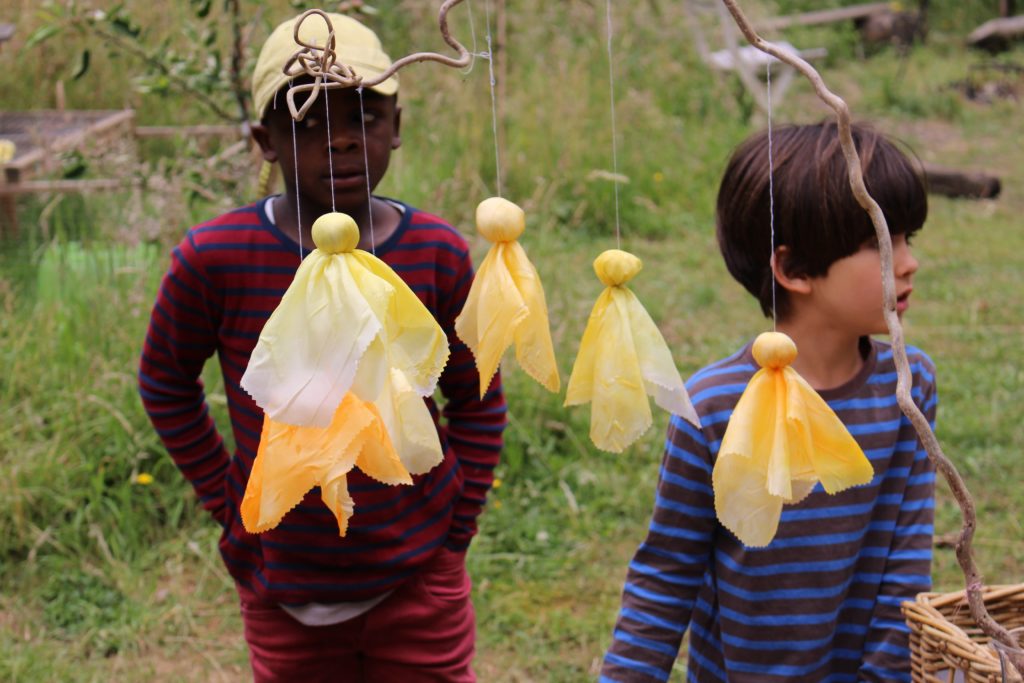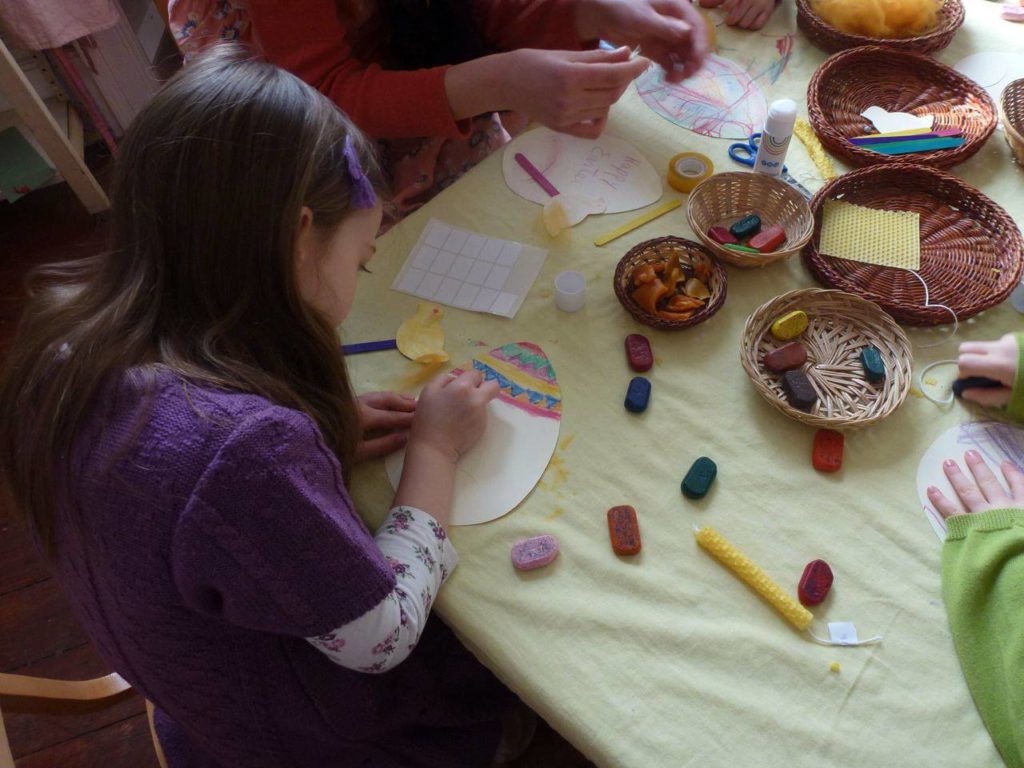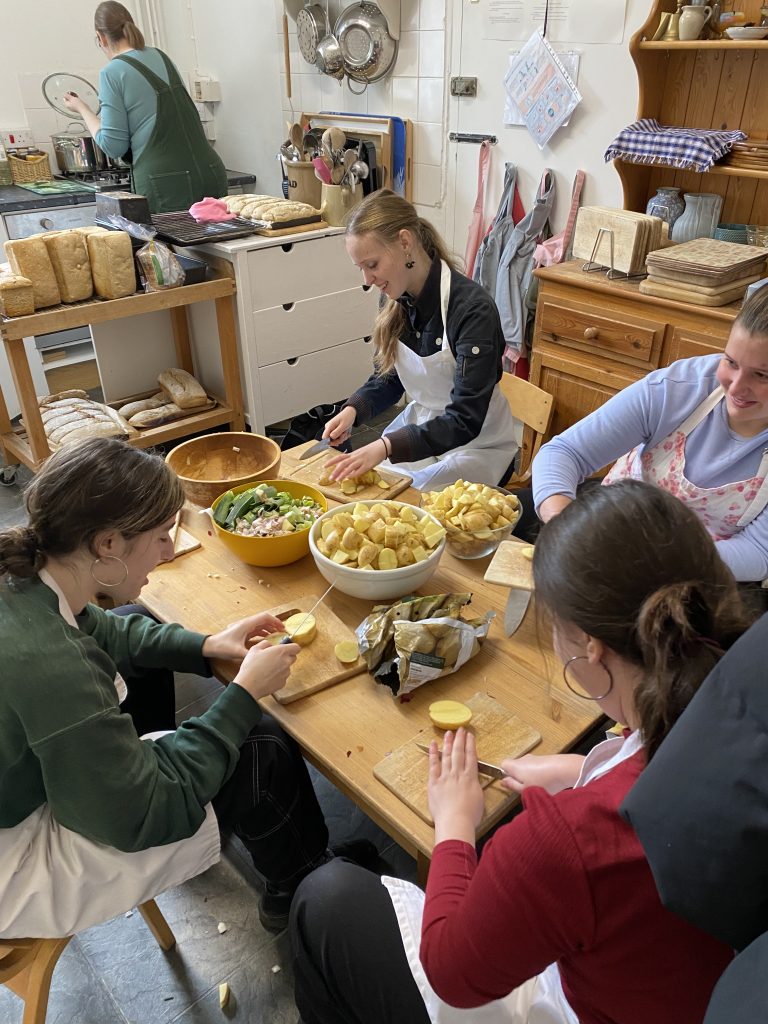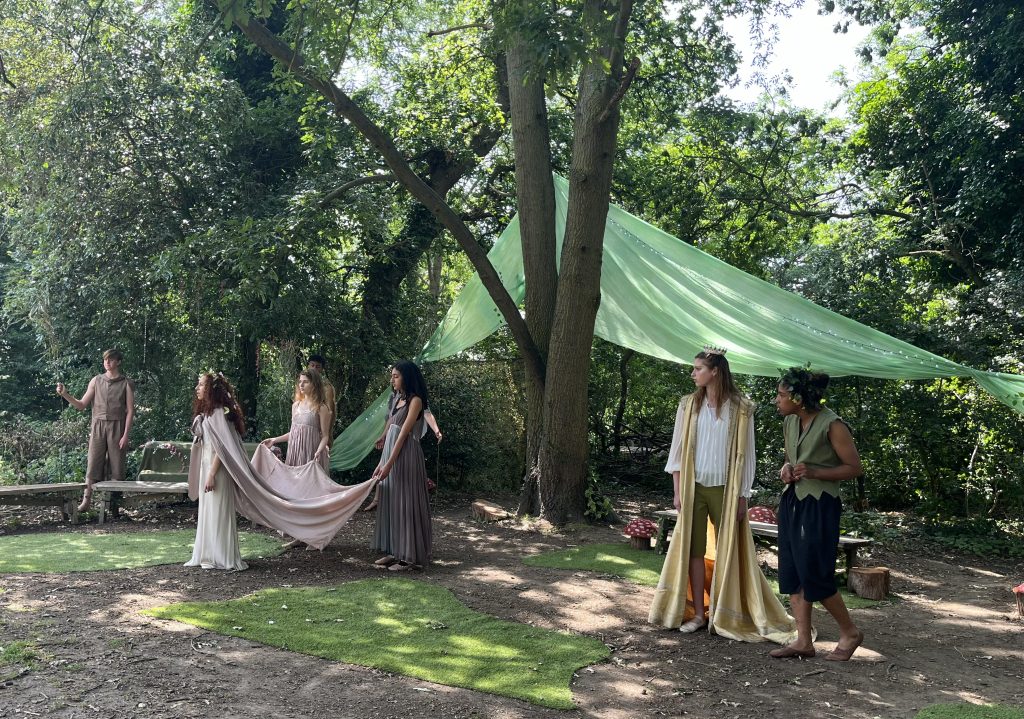Home » Search results for 'Parent & Child Groups'
Search Results for: Parent & Child Groups
Parent & Child Groups
Parent & Child Group sessions
A TEAFilms video
|
MONDAYS 10 am – 12 noon |
|
Term Dates
Parent and Child Group sessions for 2024 – 2025 |
BASIC PRINCIPLES
The principles that underlie all of our work at The St Michael Steiner School are also at the heart of our Parent and Child groups. These principles come out of observation of the developmental stages that children go through as they grow and a perception of what they need at each stage.
Our groups work out of the understanding of the young child enhanced by the work of Rudolf Steiner as well as Emmi Pikler. With this in mind, we aim to provide a supportive environment for parents and carers of young children and a nurturing one for the children themselves; this is reflected in the different groups we facilitate.
AIMS
Our most important task is to support you whilst you raise and care for your children. We know that parents/carers of young children can sometimes feel exhausted and isolated during this often joyful, fulfilling stage of family life. There is an enormous, ever-growing body of information and advice which can be very helpful, positive, practical and well-meaning. However, it is sometimes contradictory, overwhelming and, at its worst, consumerism/competition-driven.
In our Parent and Child Groups, we strive to offer balance, the opportunity to relax in nature, meet other parents or perhaps dabble in a simple seasonal craft. Or help with a little gardening, peruse the books and pamphlets on offer, whilst your children explore our garden or cosy hut, and play alongside or with each other.
Our group leaders can offer information about Steiner Waldorf Education, Emmi Pikler’s Self-Initiated Physical Development /Respectful Care, as well as parenting issues, if you want to ask them.
RHYTHM
Rhythm is natural and nourishing for young children and helps them feel secure and happy. It follows that each of our groups has a consciously chosen basic form.
Monday, Tuesday, Wednesday and Friday Morning Family Groups for birth to 3½-4 years olds last for two hours, from 10 a.m. to 12 noon. They begin in the garden where children can play freely with natural materials, dig in our sandpit, ‘cook’ in the sand kitchen, climb or roll up and down our ‘hill’, and play on swings. The hut is available for those who, at some point, need a quieter cosy indoor time with their parents enjoying the large floor cushions, the sofa and a basket of picture books, or the home corner with ‘residential doll children’ and woollen animals.
Around halfway through a session, we will wash hands and gather for a healthy shared snack (gluten-free, sugar-free and vegan apple crumble) and herb tea in the ‘barn’. There is then the opportunity for children to have a last outdoor play whilst we slowly tidy up the garden. Before the session ends, we gather on the grass area for a short ‘circle time’, which includes two or three age-appropriate seasonal songs/games in movement/verses and puppets. We end our time together with a goodbye song at the gate.
A QUIET ATMOSPHERE
City children are often surrounded by noise and busy activity, and they need a break from it even more than their parents do. We try as much as possible to provide a quiet, peaceful space in the garden and hut where the children can get lost in their play, where they can experience joy in simple wooden toys, soft dolls and gentle colours. Because our own lives are so full of technology, strong images, background music and constant chatter, these things have become normal for us and we can them out when we need to. Small children can’t do this, and, as adults, we sometimes have to work hard to create a simpler environment for our children. When you come into the Parent and Child Sessions, we hope you will find that much of the work has been done for you.
We all try to be mindful of our topics of conversation and the language and tone of voice we use.
During these times, we ask you, when possible, to participate as young children learn by imitating what people do around them rather than through being instructed. For small children, playing/practising new small/large motor skills are more important for their development than circle time. However, they still benefit from you joining; your musicality, rhythmic movement, playfulness and ultimately sociability will mean they will gain from being around the activity they often cannot resist joining in with the group themselves.
We look forward to meeting you and your children and welcoming you into our School Community.
The Early Childhood Team
PAYMENT
Your first visit to one of our groups is complimentary.
Each session is £10.00* per family (concessions are available).
The Monday, Tuesday and Wednesday Parent and Child Group sessions are bookable for half a term at a time, paid in advance. Invoices will be sent to you by our bursar, Marine Gash. The Friday session is open for half-term booking and as a drop-in session and you can pay as you go (cash or card*) at the reception.
*Additional fee of £0.10 applies for card payments made at the reception (Fridays only).
Testimonials
Testimonials
My daughter is in kindergarten. She feels very happy and safe in the school. She loves the school immensely. Over the time she has developed strong communication and social skills. Her fine motor skills are very strong. She is able to make lots of lovely craft with her little fingers. I feel the school has provided an excellent environment for my daughter’s well-rounded physical, emotional, cognitive and social development. She is really thriving fully in the school’s early years education framework.
Nisa S. (Kindergarten Parent)
We’ve had our daughter in this school for almost 3 years now and, from day 1, there wasn’t a single school morning when we didn’t see her enthusiasm about the day she had ahead. Not only do we see an extremely well-balanced child flourishing but, right from the start, we could clearly see excellent teaching standards revealed in her self-made text, maths and arts books and projects. This school is certainly having a big influence on her passion for reading, promising mathematical thinking and deep notion and daily practice of good human values. Her teacher holds the class firmly but lovingly, allowing each child to express their individuality the best way possible while keeping the group cohesive in a constant practice of respect for each other and mutual help.
Our son is now in Class 1. He joined the school for a wonderful last year in the kindergarten where the teachers made an outstanding work in getting him ready for formal learning with a weekly practice of thoughtful and dedicated projects. Now in his first grade, he’s showing an increasing interest in practicing his newly learned academic skills even at home (“self-homework”), a very good capacity to stay focused and general high enthusiasm for learning. Feeling safe, respected and appropriately stimulated at school as he does, in a classroom led by a natural-born and professionally skilled teacher, are certainly a sound basis to allow him to achieve the best academic standards possible and to become a valued and valuable citizen to the world.
Joana M. (Kindergarten & Lower School Parent)
Steiner schools are an institute of the education sector that prides itself on nurturing the human being as a whole, looking after its intellectual, physical, mental, emotional and social needs. It is an education that is organic, it bends, stretches contracts, lives and breathes. The focus is on the little humans, allowing them to grow and blossom into the beauty that they long to be. The curriculum as an overview, although very similar in content in most subjects to mainstream, is still allowed versatility to adapt to the needs of the moment it lives in.
This week again was a fine example of the versatility of Steiner Education. My Son’s classmate had been working on an interesting handwork project which required the art of weaving reeds into baskets, so he took initiative and learnt how to do it from YouTube, made his project and thought of bringing to share it with the class, but he didn’t bring in his finished project to share, no not yet, he brought in the experience! He collected all the leftover reeds and brought them to share with his class and teach them how to weave. The entire class spent their extra main lesson learning how to weave led by this young boy, the teacher included! My son then brought home his exquisitely woven plate and gave it as a present to his grandmother!
This, this is what Steiner education is really about! The learning, learning to learn! It’s not important what the content is; there is more focus on the learning, the art of teaching, transferring knowledge from one to another in a way that is most suited for the age, the class and the individual!
Meher E. (Kindergarten, Lower & Middle School Parent)
I recently moved my two children from a mainstream preparatory school focusing on 11 plus to The St Michael Steiner School because I feel the current mainstream education system is pushing our children very much down a ‘one size fits all’ academic education with the priority on passing exams and getting results. My son had started to develop signs of stress, (including a facial tic), with the amount of pressure he was under and homework assigned in order to meet the current standard in education required to pass the 11 plus. My children were not enjoying learning, not enjoying the pressures, not enjoying the homework and generally not enjoying school. In addition to this, anecdotal discussions with other employers, like me, is that children graduating from mainstream education currently have had so many years of being drilled on how to pass exams that their creative and lateral thinking skills are sorely diminished – many not knowing how to cope if they are not told what to do.
I chose to move them to a Steiner school because I strongly believe that children at the school are allowed to grow and learn at a pace that is more suited to the natural development of children. My children are now finding learning fun, which is the way it should be. Learning is a life skill that, if encouraged, will benefit them for the rest of their life. They are now enjoying school and are genuinely upset if they have to miss school when ill. They are learning from a very diverse curricula, including hands on learning, which is also giving them valuable life skills. I chose a Steiner education for them as I wish my children to be able to grow into adults that are creative and can cope with the challenges of life that inevitably require creative solutions. Discussions with the staff and older children at the Steiner school together with the evidence of the obvious happiness of my children with their new school keeps me firmly convinced that the Steiner approach to education, where the formal learning takes place at a later stage of their development and learning is encouraged in a wide number of subjects with common interlinking themes, will give my children the best opportunity to become adults capable of being happy and employable in the modern world.
Marc C. (Lower School Parent)
Our 9-year old daughter said to me the other day “I love school”. She is disappointed when she needs to miss school for a medical or dental appointment. She frequently makes comments that show that she is making connections between the things she learns at school and the things that are happening around her. For instance, a friend is visiting Israel over half term, and our daughter said – “Oh, Jerusalem is in Israel, and that is where such and such happened, I learned about that in school.” It makes me happy that the things she learns are real things, that have tangible connections to her real life. I am pleased that she is encouraged to see these connections. She is eager to come to school in the morning, and is always cheerful and happy at the end of the day. She waves at her teacher, bids him a good afternoon and tells him happily that she will see him tomorrow! She receives help in school for the tasks that are set her with which she struggles. She was slower to be comfortable reading than her peers, and her teacher was happy to speak with me about the things they had put in place to support her and to make sure that she gained the skills she needed. He and the support teacher were happy to meet with me to discuss their approach to the situation. My daughter has a number of teachers instruct her during the day, for the various subjects. I like this—she has healthy relationships with a variety of adults and she learns to recognise that there are many ways of approaching a task and interacting with others. Our daughter is learning her math skills well—the learning approach to early years math has worked well for her. She is able to apply the things that she learns in her day to day life. She demonstrates that she understands the concepts behind what she’s learning, it’s not just rote memory.
I’m pleased with the safeguarding procedures our school has put in place. For instance, the school gate is locked promptly, and people are only allowed access to the school grounds through communication with the office. Students are supervised until collected by the responsible parent or guardian. I feel the school does a good job of balancing risk management with not making my child unnecessarily frightened of possible situations that might arise. The school offers my child the chance to be confident in her own judgement and abilities while ensuring that she uses those judgement and abilities in an appropriate scope. I am pleased with the measures put in place to make sure that my child is safe from possible online dangers. The school has communicated with parents about these dangers, to make sure that we are aware of them and have implemented the appropriate restrictions in our homes, televisions, and computers. I am happy that the school offers a study group – it provides the chance for parents to understand child development more deeply, and to be able to more appropriately act in challenging parenting situations. I am a mainstream teacher, with a graduate degree in education—I feel very confident that my child is getting a good quality education at this school. She is a happy, well-adjusted child who interacts cheerfully and confidently with everyone she meets.
Jennifer B. (Lower School Parent)
I feel very lucky my wife found the kindergarten at the start of my sons schooling. We have been with St Michael’s from class one and he is in class eight now. At every stage the school has shown intelligence and compassion which has nurtured and stretched my son’s learning. As a parent I am constantly inspired by the way the school teaches: his interest in going to the school is real and his enjoyment of learning in itself is being kindled. In some ways it’s like being with a butterfly in the chrysalis. You have to trust that there is the most powerful and beautiful creature in there. Being patient, watching one’s own impulse to fearfully want your child to be somewhere they are not, it becomes possible to really appreciate childhood and the gifts of it for children and adults alike. I think that is an important thing to support and protect without letting oppressive, self-serving protocol and curricula burden the process. And what is so lovely is we are getting a few peeks at the edges of his teen wings that are developing magnificently as he nudges into the high school. The schools’ working with nourishing and supporting these butterflies really is extraordinary and skilful. The way they work with the age-appropriate learning the stages of child development, I have found utterly inspiring: It makes so much sense. When I found, our child, suddenly, one day taking reading bites out of whole bookshelves I started to realise how grateful I was he hadn’t been forced to read when it was better to be allowed to be in an earlier stage, of imitation. This school and the college are a complete godsend for me, I now know it’s possible for education to be truly useful and supportive of the truth about people, bringing out an education that respects who my son actually is and is becoming.
Elmer P. (Middle School Parent)
My three children have been at the St Michael Steiner school since 2003. We initially began in the mother/baby group as my first child seemed to entirely relax there. It felt natural to continue, and thus we stayed, with all three all having attended kindergarten, and lower school and the elder two more recently, in the Upper School.
As the method of education differs from our own experience, as well as the mainstream curriculum generally, we have had to learn with them. And what a joy that has been. On occasion there were doubts, sometimes questions but each time these were resolved by simply looking at our children, who have flourished and developed in a way we could never have imagined.
It has been satisfying, learning to be patient, having trust, developing an understanding of age-appropriate teaching and its immense benefits – intensely so now as they move through the upper school, and we see how so clearly the layers of learning integrate. Our eldest daughter is confident, clear-thinking, knowledgable and very adept practically (she taught herself the accordion for a school project and has created an income making workwear clothing and selling online). She will be making her university application at the end of this year. My second daughter studied the history of film, made a Super 8 movie and more recently returned from a month-long German language exchange. And my son returns from school every afternoon, makes us both a cup of tea and gives me a detailed run-down of the things he has learned that day. It really is his little ritual, because he’s happy and engaged.
Natalie M. (Middle & High School Parent)
As a family new to Steiner Education in September 2018, we were initially a little sceptical about the validity of Eurythmy classes. On reflection, however, and with engaged feedback from our children, we find it has been a very educational and positive experience for them. I now think that Eurythmy is opening up their special and emotional awareness of those around them, and this overflows out of the class into other parts of their lives. As teenagers, they have (naturally) become more introspective and self-absorbed. Eurythmy seems to request that they actively look out for others in the group, making space for all the individuals involved and accepting them and their contributions with open minds. I can also now appreciate that the intentional and thought-out movements involving large muscles groups of the body positively influence and strengthen smaller muscle group movements, enabling more confident hand-eye coordination and fine motor skills. The interpretation of sounds and words encourage listening skills that will improve their communication.
We are really pleased that our children are given this opportunity to experience such a creative and effective activity in their education.
Ingrid M. (Middle & High School Parent)
The High School at St Michael’s is a unique culmination of the Waldorf students progression through the years of Kindergarten and the lower school. My daughter has developed through the school from class 1 to class 9 High school. This year she has demonstrated the ability to complete eloquent and well-structured essays in English and Humanities. She has completed independent projects, recitations and presentations. I have been impressed by her documentation of experiments in Science and the solving of complex algebraic problems. She uses IT appropriately to support and complete assignments. She is developing her interest in music composition in the current music block and is playing both the piano and clarinet. She is motivated and committed to completing her CSE at St Michaels. We live and socialize in a mixed community of families, who attend state mainstream, private schools and Steiner schools. My daughter tells me she is happy with her education at St Michael Steiner School and she has ambitions to continue in further education. I am delighted with the progress she has made in her work in class 9 and the young adult she is becoming.
Eleanor D. (High School Parent)
Our son went to a wonderful, small church state Primary from the age of 3-10 but despite being nurtured there he didn’t thrive educationally, he wasn’t learning in the way he needed to be taught. Having endured the constant evidence-based, ‘box ticking’ processes of navigating through Mainstream, we realised that he needed much more time and creativity to allow his education to take root. Learning to test and being young in his year would have led him down a very difficult route through education and done nothing for his self-esteem. Our options were very unsatisfactory despite several outstanding Ofsted schools being local, they were not going to be the answer.
We wish we had found St Michael’s sooner for our son…. it has extended his childhood and given him the opportunity to initiate, debate, express and execute a whole range of subjects he may never have had the opportunity to try. Rather than being weighed down by testing, the students focus on where they are now, daily developing courage and confidence working closely with each other and their mentors. The teachers, who we cannot fault in their commitment and skills, are instilling a love of learning, and a pride in their work and presentation.
Now, in the High School, there is a wonderful energy in Class 9, a curiosity to learn and a feeling of responsibility present. some astonishing talents emerge through a broad and inspiring curriculum which, rather than limiting choices at this age (pre-GCSE), is opening their horizons and interests at a time when they need it most.
The school is a safe and welcoming base with a huge sense of being part of a community, working together and connecting with all age groups.. something that everyone needs in life whatever else they achieve.
Sophie W. (High School Parent)
Please applaud the different approach this school has to offer, it is a refreshing and healthy, heart-warming oasis in which many children can be who they are and flourish. They should be proud of their education when they step into the world.
My daughter has started this year in class 9. She was in mainstream education (at a very good primary school where I was and remain a school governor), until the end of her year 5 when we moved her to St Paul’s Steiner School in Islington.
We have made a decision to keep her in Steiner education even though it is very difficult, expensive and inconvenient as we live on the opposite side of London and her journey time to school is up to two hours each day.
We have no regrets about our decision (and neither does our daughter) since the quality of the education she receives is excellent. In my capacity as school governor in her previous school, I spend a lot of time sifting through data pertaining to progress and achievement. I and the teaching staff know that this data does not represent the ‘real’ progress and attainment of the children save in the very narrow boundaries that Ofsted are (or were until recently) interested in. We also know that the collection of the data is contrary to the needs of the children. At St Michael school I have no such concerns. I am aware daily of her progress, her critical thinking has been sharpened beyond measure. (I am a university lecturer and I wish that my students had critical abilities even close to those of the current class 9). Her knowledge of subjects is wide, varied and increasingly comprehensive and this is the result of the content and delivery of the wide and creative curriculum (so lacking in mainstreams schools). Her knowledge of gardening finds a place with her literacy, her history and her mathematics. The subjects combine and integrate as they should. She has developed a resilience that she never would have developed in her mainstream school along with a thirst to learn things for their own sake rather than to pass tests created for the agendas of others.
She feels very safe at the school because she is safe there. Hence she is happy and willing to get out of bed each day at 6am and take a long and tedious commute on a packed train from one side of London to the other, change trains and then finally cycle the last two miles to the school. I would commend the school and its curriculum and philosophy to anybody.
Gordon M. (High School Parent)
Kindergarten
A TEAFilms video
In Steiner Waldorf schools, like many educational systems in Europe, formal learning does not begin until the children are in their seventh year. The time when they naturally become ready for school is usually marked by the change of teeth. Before that, all of their life forces are needed to develop a strong, healthy body; to draw on these forces for intellectual work during the first seven years would be to compromise that development. “The child in the first seven years is wholly sense-organ, and reacts to all the impressions aroused in him by the people around him. Therefore the essential thing is not to imagine that the child can be taught what is good or bad, that he can be taught this or that, but to know that everything that is done in his presence is transformed in his childish organism into spirit, soul and body.” RUDOLF STEINER
“The child in the first seven years is wholly sense-organ, and reacts to all the impressions aroused in him by the people around him. Therefore the essential thing is not to imagine that the child can be taught what is good or bad, that he can be taught this or that, but to know that everything that is done in his presence is transformed in his childish organism into spirit, soul and body.” RUDOLF STEINER
 A clear daily, weekly and seasonal rhythm brings a sense of belonging and security, allowing each child to develop at his or her own pace. Then, about halfway through their seventh year, the children are usually ready to enter the Lower School.
A clear daily, weekly and seasonal rhythm brings a sense of belonging and security, allowing each child to develop at his or her own pace. Then, about halfway through their seventh year, the children are usually ready to enter the Lower School.
“In the beginning the child just plays, but he plays in earnest. There is only one difference between the play of the child and the work of the adult. It is that the adult adapts himself to the outer utility that the world demands; his work is determined from without. Play is determined from within, through the being of the child which wants to unfold. Up to now very little has been done to introduce the child in the right way to the complicated life of today. It is the task of the school gradually to lead him over from play into work. If we once find the answer to the question how can we metamorphose play into work, we shall have solved the fundamental problem of all early years education. Our basis ought to be the fact that the small child’s most ardent wish is to imitate the work of grown-up people, whether it is done with a spade or a knitting needle.” RUDOLF STEINER
Homepage
Founded in 2001, the St. Michael Steiner School offers Parent & Child groups, Kindergarten and Classes 1 to 12, providing for children and students from birth to 18.
“The Waldorf school represents a chance for every child to grow and learn according to the most natural rhythms of life. For the early school child, this means a non-competitive, non-combative environment in which the wonders of science and literature fill the day without causing anxiety and confusion. For the older child, it offers a curriculum that addresses the question of why they are learning. I have sent two of my children to Waldorf schools and they have been wonderfully well served.”
Raymond McDermott, Ph.D., Professor of Education and Anthropology, Stanford University


















“Steiner Waldorf Education addresses the child as no other education does. By the time they reach us at the college and university level, these students are grounded broadly and deeply and have a remarkable enthusiasm for learning. Such students possess the eye of the discoverer, and the compassionate heart of the reformer which, when joined to a task, can change the planet.”
Arthur Zajonc, Ph.D., Associate Professor of Physics, Amherst College.


